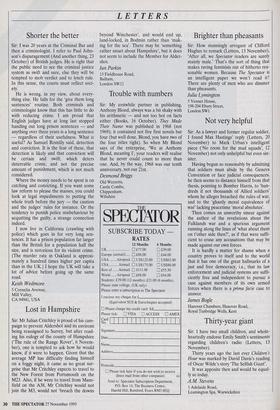LETTERS Shorter the better
Sir: I was 20 years at the Criminal Bar and then a criminologist. I refer to Paul John- son's disparagement (And another thing, 23 October) of British judges. He is right that the public need to see the criminal justice system as swift and sure, else they will be tempted to mob verdict and to lynch rule. In this sense, the courts must reflect soci- ety.
He is wrong, in my view, about every- thing else. He falls for the 'give them long sentences' routine. Both criminals and criminologist know that this has little to do with reducing crime. I am proud that English judges have at long last stopped handing out long prison sentences — and anything over three years is a long sentence — regardless of their usefulness. What is useful? As Samuel Romilly said, detection and conviction. It is the fear of these, that detection is likely and that conviction will be certain and swift, which deters deterrable crime, and not the precise amount of punishment, which is not much considered.
Where the money needs to be spent is on catching and convicting. If you want some law reform to please the masses, you could look at legal impediments to putting the whole truth before the jury — the caution and the judges' rules for instance. Or the tendency to punish police misbehaviour by acquitting the guilty, a strange connection indeed.
I now live in California (crawling with police) which goes in for very long sen- tences. It has a prison population far larger than the British for a population half the size, and is notorious for its violent crime. (The murder rate in Oakland is approxi- mately a hundred times higher per capita than in the UK.) I hope the UK will take a lot of advice before going up the same road.
Keith Wedmore
5 Cornelia Avenue, Mill Valley, CA 94941, USA










































































 Previous page
Previous page